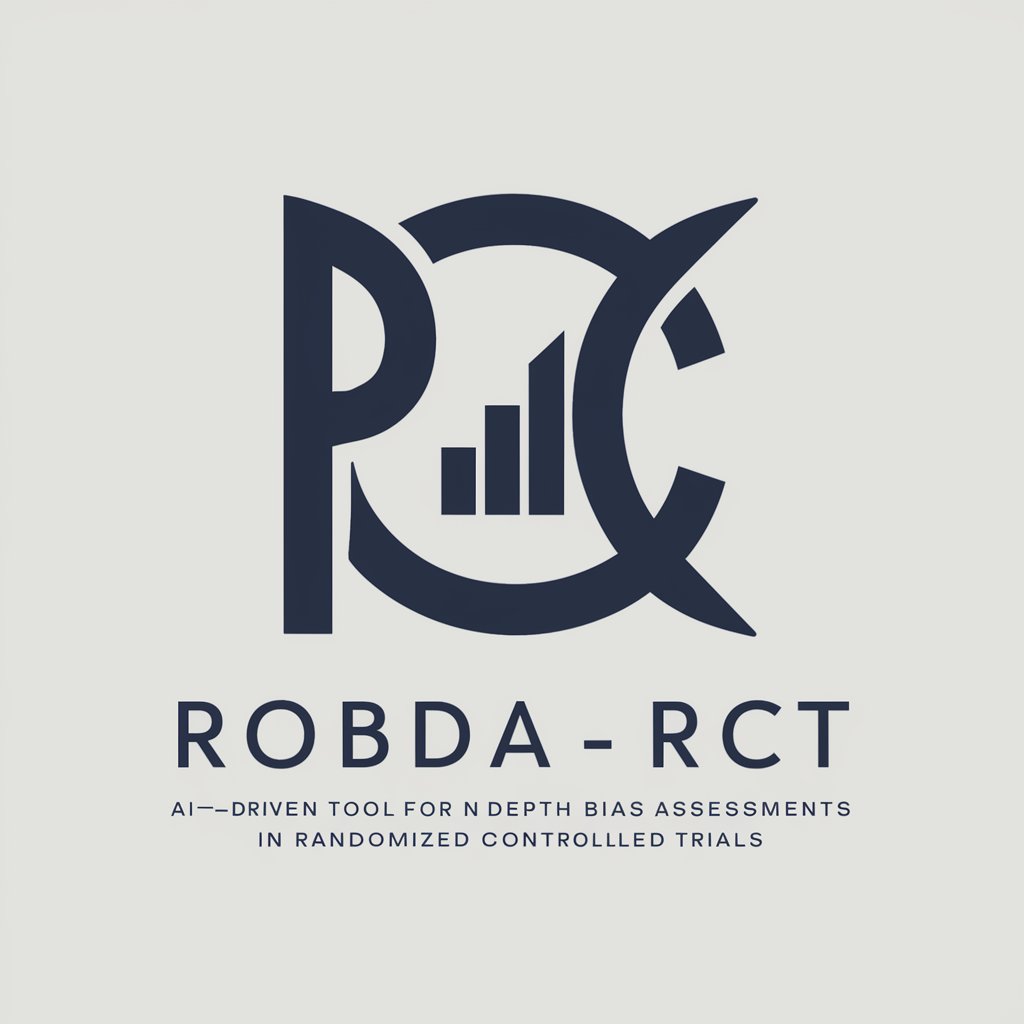RoBDA - RCT - Bias Assessment Tool

Welcome to RoBDA - RCT, your partner in bias assessment.
AI-driven RCT Bias Analysis
Can you analyze the risk of bias in this randomized controlled trial?
Please provide a detailed assessment of the randomization process for this study.
How does this trial address deviations from intended interventions?
Evaluate the selection of reported results in this RCT.
Get Embed Code
Introduction to RoBDA - RCT
RoBDA - RCT, standing for Risk of Bias Assessment in Randomized Controlled Trials, is a specialized tool designed to facilitate a comprehensive and structured analysis of potential biases in randomized controlled trials (RCTs). Its primary purpose is to help researchers, clinicians, and policy-makers critically evaluate the integrity and reliability of RCT findings by systematically examining various domains of bias that could affect the trial's outcomes. For example, it assesses the randomization process to ensure that it minimizes selection bias and ensures comparability between intervention groups. It also evaluates deviations from intended interventions, the extent and impact of missing outcome data, the accuracy of outcome measurement, and the selection of reported results. An illustrative scenario might involve a research team conducting a meta-analysis of RCTs on a new cardiovascular drug. They would use RoBDA - RCT to assess each study's risk of bias, ensuring their findings are based on high-quality evidence. Powered by ChatGPT-4o。

Main Functions of RoBDA - RCT
Assessment of the Randomization Process
Example
Analyzing allocation sequence generation and concealment mechanisms to ensure they adequately prevent foreknowledge of treatment assignments, thus minimizing selection bias.
Scenario
In a trial comparing two hypertension treatments, RoBDA - RCT would evaluate whether the method of randomizing participants effectively prevents researchers and participants from predicting assignments, ensuring comparability between groups.
Evaluation of Deviations from Intended Interventions
Example
Examining how deviations from the protocol impact study outcomes and whether the analysis accounts for these deviations appropriately.
Scenario
In a study on diabetes management, RoBDA - RCT would assess how deviations, such as participants not adhering to the intervention protocol, are accounted for in the study's analysis.
Analysis of Missing Outcome Data
Example
Determining the extent of missing data and its potential impact on the reliability and validity of the trial's results.
Scenario
In an RCT on a new cancer therapy, RoBDA - RCT would investigate how much data is missing, why it's missing, and how this affects the interpretation of the treatment's efficacy.
Measurement of the Outcome
Example
Evaluating the methods used to measure trial outcomes and the blinding of assessors to minimize detection bias.
Scenario
For a trial assessing the effectiveness of a mental health intervention, RoBDA - RCT would scrutinize the objectivity of outcome measurement methods and whether outcome assessors were blinded to treatment allocation.
Selection of the Reported Result
Example
Reviewing pre-specified plans for data analysis and whether the reported results selectively emphasize favorable findings.
Scenario
In an RCT on a new diet regimen, RoBDA - RCT would examine if the analysis was pre-planned and whether the selection of reported outcomes could introduce bias.
Ideal Users of RoBDA - RCT Services
Researchers and Academics
Individuals conducting or analyzing RCTs in any field of medicine or public health who require rigorous evaluation of study integrity and bias. They benefit from RoBDA - RCT by ensuring their work or the studies they include in systematic reviews are of high quality and low bias.
Healthcare Policy-Makers
Officials and decision-makers who rely on evidence from RCTs to inform healthcare policies and guidelines. They use RoBDA - RCT to ascertain the reliability of the evidence base, ensuring policies are supported by trustworthy data.
Clinical Practitioners
Healthcare providers who use evidence from RCTs to make clinical decisions. RoBDA - RCT helps them understand the potential biases in studies, aiding in the critical appraisal of evidence before applying it to patient care.
Pharmaceutical Companies
Organizations involved in drug development and clinical trials who need to assess and demonstrate the quality and reliability of their RCTs. RoBDA - RCT can be used to identify and mitigate risks of bias in their studies, supporting regulatory submissions and market trust.

How to Use RoBDA - RCT
1
Start by accessing yeschat.ai for an initial trial without the need to sign in or subscribe to ChatGPT Plus.
2
Select the RoBDA - RCT tool from the list of available tools to begin your bias assessment in randomized controlled trials.
3
Input the details of the RCT you wish to assess into the tool, including trial design, interventions, outcomes, and participant information.
4
Follow the structured assessment process by evaluating each bias domain using the guidance provided within the tool.
5
Review the generated bias assessment report, which includes detailed findings and recommendations for each evaluated domain.
Try other advanced and practical GPTs
Prompt Engineer Guide
Enhance AI Interactions with Smart Prompting

Freelance Assist AI
AI-powered freelancing support at your fingertips

Nightmare Weaver
Craft Your Fear with AI

文法檢查
Enhancing Text Clarity with AI

Advogado
Empowering Legal Professionals with AI

Sketch Transformer
Turn sketches into masterpieces with AI

TranscribeMail
Elevate Your Email with AI

StoryGPT- Help Me Develop A Story Movie Idea
Craft Your Story with AI

Sir Johnny Bot on the Spot
Empowering content with AI-driven insights

Top MBA Admission - Based on 12 Years Experience
Empowering Your MBA Journey with AI

The Cheese Explorer🧀
Embark on a Tailored Cheese Journey

excelGPT
AI-powered Excel Problem Solver

Frequently Asked Questions about RoBDA - RCT
What is RoBDA - RCT?
RoBDA - RCT is an AI-powered tool designed to assess biases in randomized controlled trials (RCTs) across multiple domains, providing a structured and comprehensive bias analysis.
How does RoBDA - RCT handle missing outcome data?
The tool evaluates the extent of missing data, its impact on the study results, and offers insights on how these factors may bias the trial's outcomes.
Can RoBDA - RCT assess bias in crossover RCTs?
Yes, it includes a specific section for assessing the risk of bias from period and carryover effects in crossover RCTs, focusing on sequence allocation, period effects, and the time for dissipation of carryover effects.
Is RoBDA - RCT suitable for evaluating trial protocols and amendments?
Absolutely. It analyses the trial design, statistical analysis plans, and any protocol amendments to identify potential biases introduced at the planning stage.
How can RoBDA - RCT improve the reliability of my research findings?
By systematically identifying and addressing potential biases, RoBDA - RCT helps enhance the credibility and reliability of research findings from RCTs, facilitating more informed decisions in clinical and policy-making contexts.
